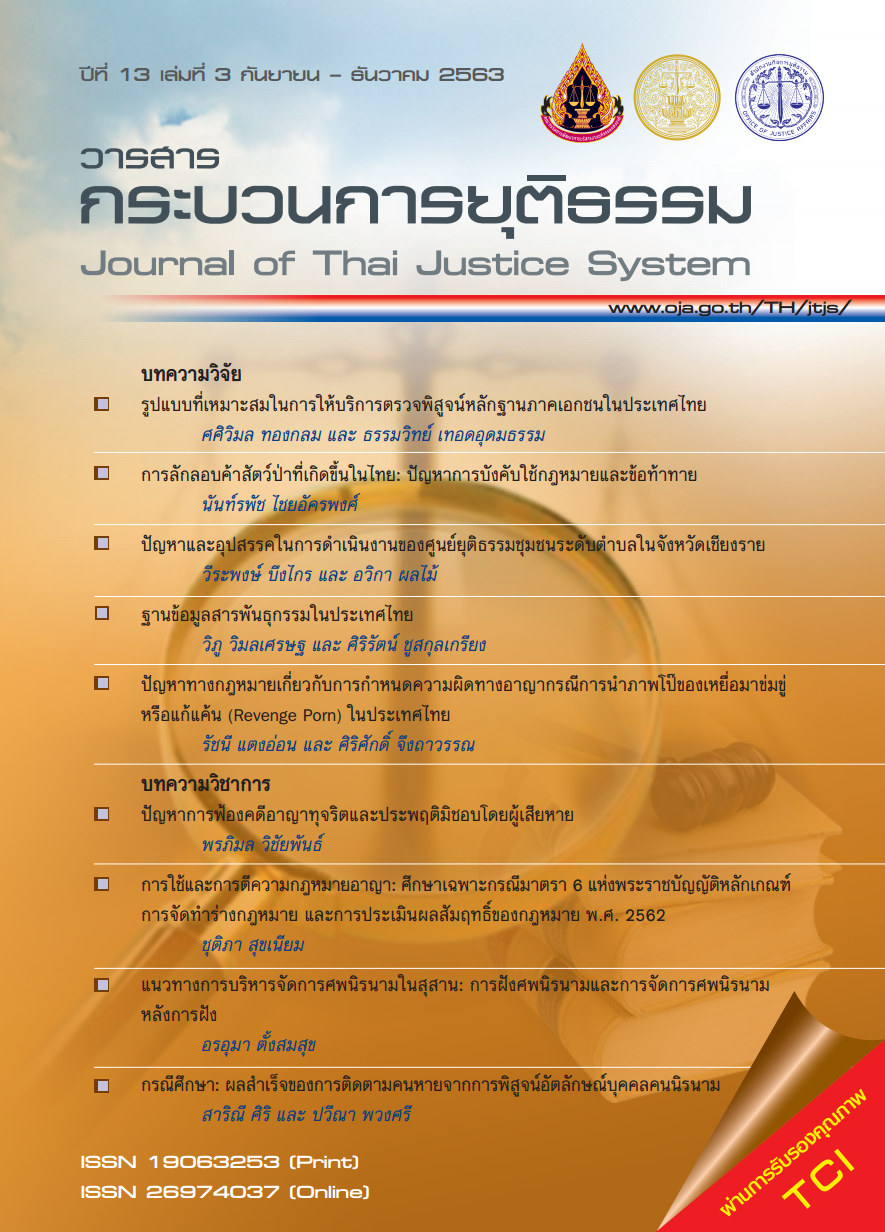ปัญหาการฟ้องคดีอาญาทุจริตและประพฤติมิชอบโดยผู้เสียหาย
Main Article Content
บทคัดย่อ
พระราชบัญญัติวิธีพิจารณาคดีทุจริตและประพฤติมิชอบ พ.ศ. 2559 ได้กำหนดให้ผู้เสียหายสามารถเป็นโจทก์ฟ้องคดีทุจริตและประพฤติมิชอบต่อศาลได้โดยตรง โดยไม่ต้องผ่านการตรวจสอบจากหน่วยงานของรัฐที่มีหน้าที่ในการป้องกันและปราบปรามการทุจริต บทความนี้จึงมุ่งศึกษาแนวคิดในการดำเนินคดีอาญา แนวคิดในการกำหนดความผิดต่อตำแหน่งหน้าที่ราชการ ความเป็นผู้เสียหาย คุณธรรมทางกฎหมาย และการดำเนินคดีทุจริตและประพฤติมิชอบในประเทศไทย จากการศึกษาพบว่า การกำหนดให้ผู้เสียหายสามารถฟ้องคดีทุจริตและประพฤติมิชอบต่อศาลได้โดยตรง ขัดต่อคุณธรรมทางกฎหมาย เป็นการสร้างองค์กรคู่ขนานกับองค์กรของรัฐที่มีอำนาจหน้าที่ในการไต่สวนดำเนินคดีกับเจ้าหน้าที่ของรัฐ ไม่มีการตรวจสอบกลั่นกรองการกล่าวหาเจ้าหน้าที่ของรัฐก่อนนำคดีขึ้นสู่ศาล นำไปสู่ความล่าช้าในการพิจารณาพิพากษาคดี ไม่เป็นไปตามวัตถุประสงค์และความมุ่งหมายในการจัดตั้งศาลอาญาคดีทุจริตและประพฤติมิชอบ โดยจากสถิติการฟ้องคดีต่อศาลอาญาคดีทุจริตและประพฤติมิชอบกลาง และศาลอาญาคดีทุจริตและประพฤติมิชอบภาค 1-9 พบว่าระหว่าง พ.ศ. 2559-2562 ผู้เสียหายฟ้องคดีทุจริตและประพฤติมิชอบมากที่สุด โดยฟ้องคดีรวม 2,166 คดี คิดเป็นร้อยละ 47.17 ของปริมาณคดีที่เข้าสู่การพิจารณาพิพากษาของศาล ก่อให้เกิดปัญหาจากการฟ้องคดีอาญาทุจริตและประพฤติมิชอบโดยผู้เสียหาย ทั้งปัญหาในการพิจารณาความเป็นผู้เสียหาย ปัญหาการฟ้องคดีโดยไม่มีความรู้ความเข้าใจในคดีทุจริตและประพฤติมิชอบ ปัญหาการฟ้องคดีโดยไม่สุจริต ปัญหาการฟ้องคดีที่ขัดต่อเจตนารมณ์ของกฎหมาย และปัญหาการฟ้องคดีโดยไม่มีการไต่สวนข้อเท็จจริง ส่งผลกระทบต่อเจ้าหน้าที่ของรัฐและระบบบริหารราชการแผ่นดิน
Article Details
ต้นฉบับที่ได้รับการตีพิมพ์ในวารสาร เป็นลิขสิทธิ์ของวารสารกระบวนการยุติธรรม แต่ความคิดเห็นที่ปรากฏในเนื้อหาของบทความในวารสารกระบวนการยุติธรรม ถือเป็นความรับผิดชอบของผู้เขียนแต่เพียงผู้เดียว
เอกสารอ้างอิง
คณิต ณ นคร. (2552). วิ.อาญาวิพากษ์. กรุงเทพฯ: วิญญูชน.
คณิต ณ นคร. (2556). ข้อกฎหมายในคดีนายกอานันท์ (พิมพ์ครั้งที่ 2). กรุงเทพฯ: วิญญูชน.
คณิต ณ นคร. (2559). ประมวลกฎหมายอาญาหลักกฎหมายและพื้นฐานการเข้าใจ (พิมพ์ครั้งที่ 12). กรุงเทพฯ: วิญญูชน.
คณิต ณ นคร. (2560). กฎหมายอาญาภาคทั่วไป (พิมพ์ครั้งที่ 6). กรุงเทพฯ: วิญญูชน.
คณิต ณ นคร. (2561). กฎหมายวิธีพิจารณาความอาญา (พิมพ์ครั้งที่ 9). กรุงเทพฯ: วิญญูชน.
โชคสุข กรกิตติชัย. (2559). การจัดตั้งศาลอาญาคดีทุจริตและประพฤติมิชอบ. ค้นเมื่อ 4 เมษายน 2563, จาก https://www.parliament.go.th/ewtadmin/ewt/parcy_train/ewt_dl_link. php?nid=32609
ดาริน บุญมาเลิศ. (2554). การฟ้องคดีในความผิดตามประมวลกฎหมายอาญา มาตรา 157. วิทยานิพนธ์นิติศาสตรมหาบัณฑิต. มหาวิทยาลัยธุรกิจบัณฑิตย์.
ธานิศ เกศวพิทักษ์. (2561). คำอธิบายพระราชบัญญัติจัดตั้งศาลอาญาคดีทุจริต และประพฤติมิชอบและวิธีพิจารณาคดีทุจริตและประพฤติมิชอบ พ.ศ. 2559. กรุงเทพฯ: วิญญูชน.
ปกป้อง ศรีสนิท. (2550). ปัญหาการดำเนินคดีอาญาโดยผู้เสียหาย. ใน รวมบทความงานวิชาการประจำปี พ.ศ. 2550 (พิมพ์ครั้งที่ 3). กรุงเทพฯ: โรงพิมพ์มหาวิทยาลัยธรรมศาสตร์.
พัสสน ตันติเตมิท. (2555). ความผิดฐานเจ้าพนักงานปฏิบัติหน้าที่โดยมิชอบ ตามประมวลกฎหมายอาญา มาตรา 157. วิทยานิพนธ์นิติศาสตรมหาบัณฑิต. มหาวิทยาลัยธรรมศาสตร์.
สำนักงานคณะกรรมการกฤษฎีกา. (ม.ป.ป.). ร่างที่ สคก. ตรวจพิจารณาแล้ว เรื่องเสร็จที่ 359/2559 เรื่อง “บันทึกหลักการและเหตุผล ประกอบร่างพระราชบัญญัติวิธีพิจารณาคดี ทุจริตและประพฤติมิชอบ พ.ศ. ....”. ค้นเมื่อ 25 เมษายน 2563, จาก http://web.krisdika.go.th /data/news/news11977.pdf
สำนักงานศาลยุติธรรม. (2560). รายงานสถิติคดีศาลยุติธรรมทั่วราชอาณาจักร ประจำปี พ.ศ. 2560. ค้นเมื่อ 25 เมษายน 2563, จาก https://oppb.coj.go.th/th/content/cate gory/detail/id/8/cid/2085/iid/94936
สานักงานศาลยุติธรรม. (2561). รายงานสถิติคดีศาลยุติธรรมทั่วราชอาณาจักร ประจำปี พ.ศ. 2561. ค้นเมื่อ 25 เมษายน 2563, จาก https://oppb.coj.go.th/th/content/category/detail/id/8/cid/2085/iid/142443
สำนักงานศาลยุติธรรม. (2562). ผลการดำเนินงานศาลอาญาคดีทุจริตและประพฤติมิชอบทั่วราชอาณาจักร ประจำปี พ.ศ. 2562. ค้นเมื่อ 25 เมษายน 2563, จาก https://oppb.coj.go.th/th/content/category/detail/id/8/cid/2089/iid/184799
สุรพล นิติไกรพจน์. (2536). ทฤษฎีแบ่งแยกอำนาจกับการห้ามศาลพิจารณาคดีที่ฝ่ายปกครองเป็นจำเลย. ใน ข้อกฎหมายในคดีนายกอานันท์ (พิมพ์ครั้งที่ 2). กรุงเทพฯ: วิญญูชน.
อรรถพล ใหญ่สว่าง. (2524). ผู้เสียหายในคดีอาญา. วิทยานิพนธ์นิติศาสตรมหาบัณฑิต. มหาวิทยาลัยธรรมศาสตร์.
อัญชลี ฉายสุวรรณ. (2534). การทดแทนค่าเสียหายแก่ผู้เสียหายในคดีอาญาหรือเหยื่ออาชญากรรมโดยรัฐ. วิทยานิพนธ์นิติศาสตรมหาบัณฑิต. จุฬาลงกรณ์มหาวิทยาลัย.
อุดม รัฐอมฤต, วีรวัฒน์ จันทโชติ, ปกป้อง ศรีสนิท, วีระศักดิ์ แสงสารพันธ์, ชาลินี ถนัดงาน และนัทธี ฤทธิ์ดี. (2555). รายงานการวิจัยฉบับสมบูรณ์โครงการศึกษาความเหมาะสมในการปฏิรูปกฎหมายที่เกี่ยวข้องกับการกระทำความผิดต่อตำแหน่งหน้าที่ตามประมวลกฎหมายอาญา มาตรา 157. กรุงเทพฯ: สถาบันวิจัยและให้คำปรึกษาแห่งมหาวิทยาลัยธรรมศาสตร์.
อุทัย อาทิเวช. (2554). คู่มือกฎหมายวิธีพิจารณาความอาญา เล่ม 2 สิทธิของผู้เสียหายในคดีอาญา. กรุงเทพฯ: วี.เจ.พริ้นติ้ง.
เอกูต์ เอช. (2477). กฎหมายอาญา. กรุงเทพฯ: โรงพิมพ์มหาวิทยาลัยธรรมศาสตร์.


